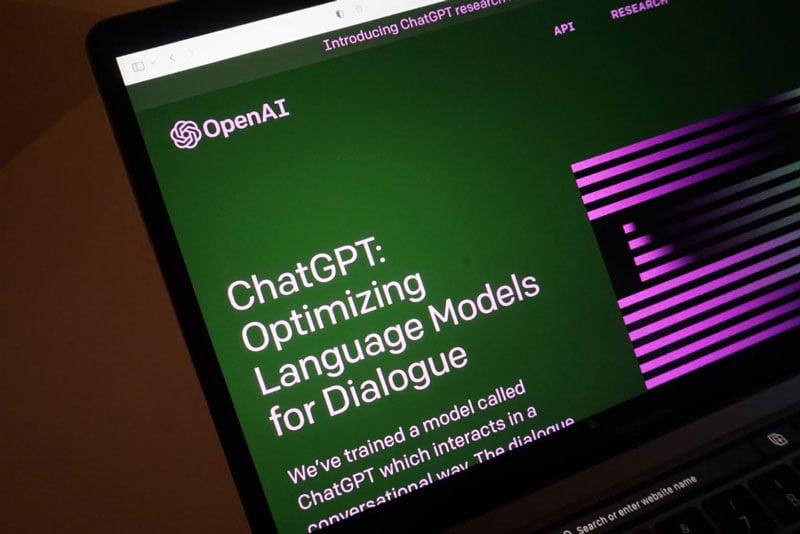
Damian: A lot has happened in technology in the marketing industry over the past year. AI is, of course, a clear example. We have many new tools, new apps, new ways of using the AI in marketing operations like researching, brainstorming or writing. You wrote that as much as 37% of marketers are using AI. How do you predict the development of AI usage within marketing in the upcoming months?
Gregory: That's an interesting question. I think there's a ton of really interesting stuff out there. The stat was that, according to a survey I found, 37% of marketers say they're using AI daily. I think it's a pretty high number.
My guess is that they're using mainly ChatGPT or writing tools. There's a tool called Writer, which just got a big round of funding. It’s similar to ChatGPT, but it's got guardrails and it helps you do blogging and other types of business writing. It’s also got some great features that allow you to work as a team.
There's a lot of other tools right now that are coming out that are popular. There's some things I've been using to automatically edit video. There are tools like Midjourney and some of the image generation tools that I think some marketers are using.
But I think the vast majority are just using some version of an AI-powered writing tool. Things like Grammarly or some of the other editors are actually also powered by AI as well. So technically, the number might be a lot higher than 37%.
I feel that many marketers are trying to find out where AI is doing a good job to know where they can use it, to what extent they can utilize it in their work.
I agree. I think we don't know the full capabilities.
There are people who are very excited about it, and perhaps overestimate what it can do. There are also people who are very negative, and I think they're underestimating what it can do. Tools are getting better. I get a lot of value out of them. They make me work faster, they make the quality better.
Tools are getting better. I get a lot of value out of them. They make me work faster, they make the quality better. Share on XBut I think there's also another dimension to all this, which is the user's ability to employ the tools and use them to get value. I think that's far from where it needs to go. As people get better at using these tools, they'll find ways to get more value.
So we've got both angles, right? Tools have to get better, which they are, and the users have to get better at using and applying the tools, and that's happening as well.
I think the other thing that's happening is that some of the more automated stuff that people are excited about with AI, has already stopped working.
Like with that completely AI-generated blog, which was gaining a lot of search traffic initially. But recently it all fell off. Google is starting to figure out if you have a purely AI-generated content farm, and it's blocking that.

So there was a lot of enthusiasm early when ChatGPT came out with these hacks that I'm not a big fan of, and I don't think marketers should be a big fan of. And whatever window of opportunity there was to gain value from that seems like it's closing.
I'm not a big fan of automated spam, and I see a lot of that now. I know all the automated spam comments that you see now in social media that are clearly AI-generated. They don't have any value. People don't like them. No one responds to them. It's all just a lot of garbage that's cluttering up the internet and preventing people from having real conversations and making real connections and creating things of real value.
I know all the automated spam comments that you see now in social media that are clearly AI-generated. They don't have any value. People don't like them. No one responds to them. Share on XAnd I think that that's what people should focus on. And if AI can help you do that, that's excellent. I find that AI does help me do that. Helps me create content of a much higher quality.
There are also tools that work as your own internal ChatGPT with your own content like technical data of your products. I think it has enormous potential in creating content because marketers can instantly get AI-generated content based on everything the company has about the product or the customer.
I agree. People are definitely working on tools that allow you to incorporate a lot of your own data. I know a hack where I upload or provide data or information to get a more unique result. I think that's really important.
If you just use the standard tools that are out there, you're going to end up with a rather mediocre result that's just the lowest common denominator of what it can find across the Internet. But if you give it your own information, the results are a lot better.

Things like case studies are a good example where AI just can't generate it. It needs to understand the specifics of the company or the customer. And so I think there's a lot of use cases like that where you have to have original information and data in order to generate some kind of result from ChatGPT or whatever it is.
If you start to think through all the tasks that marketers do, there's all kinds of places where AI has an impact. And that's fantastic. But there's a lot of places where it's not quite as impactful. It requires original thinking, original content, whatever is required to do something that's unique to the product or to the customer.
You wrote on X (ex-Twitter) that “There is so little authenticity out there. When people find it, they love it.” Earlier, you said that there’s a lot of garbage because of badly used AI. Why do you think there's so little authenticity out there, both in general, and in terms of using AI?
You've got this whole layer of just spam. And the Internet is just full of it. It might be half or even 80% of all email. It's just low quality, automated garbage that is not really of value. And it's not authentic. And they've got a lot of people in marketing who just try to market their products. But it's not content that connects with the end user. It's not something that really resonates with people emotionally. It's either derivative or just poor quality.
They've put some effort into it. They've thrown some stuff up on their Instagram account or written a blog, but they're not really dedicated to it. They're not trying to do something original, something excellent, something authentic. And I think that when people do authentic content, have taken a unique approach, and are really putting themselves out there, it really resonates with people.
The other dimension, I think, is the legacy of advertising, television and high quality content. I grew up in a world with high quality television commercials and TV shows. They were very inauthentic. They were scripted and the story lines were very familiar. All the television commercials were the same. They were scripted, were high quality, were professionally shot and polished and cleaned up, and they looked perfect. And the real world, when you create a video, does not look like that.
And I think there was this transition point on the internet where there were some people that were doing user generated content, creating videos that were not high quality nor scripted. And I think people love that. I think people love authentic content, because it's like having a conversation with your friend and it’s really resonating with them.
I think people love authentic content, because it's like having a conversation with your friend and it’s really resonating with them. Share on XAirbnb did the first TV commercial that I'm aware of that used all user generated content. They just used videos and photos from their users. Very authentic. I think it worked really well, and people loved that. I think the internet is an excellent place for that type of work.
Let's jump into the ecommerce business. Out of professional curiosity, what annoys you the most when you're shopping online?
So many things!
Trying to find the right product is still really difficult. I was trying to buy a new microphone the other day. I was trying to find a certain brand but I couldn't find it, so I had to search for similar microphones and I couldn't find what I was looking for. I don't know if there's a UI solution for this.
There are so many options now. When I try to find something on Google or Amazon, or however I'm searching for a product, I'm just overwhelmed with options. The results are now also flooded with ads or options that I don't want. I got lots of very low-cost microphones that would get the first slot, and that was not what I was looking for. So that's probably my number one thing.
Buying things on mobile is still hard as well. I think Amazon is pretty good. I buy things on Amazon on my phone, but I'd like it to be easier to buy things on mobile.
I often buy bike parts, replacement bicycle materials or things I need on my phone. It’s when I'm riding my bike or storing my bike, and I realize that I need a new tire or I need a new tube and I try to buy it on my phone. So the mobile UI of buying those things, that part is also really important.

The last one I'll leave you with is that I think that the images or the ability to show the product still could be improved. I can't for example always get a sense of how large it is or all of the features or what does it come with, all the accessories.
I'd love for it to be better, to be able to understand exactly what I'm buying and what I'm getting. What is actually included and what am I seeing? What am I actually going to get? You've seen those funny memes where people will see a coat on the model and then they get the coat and it's not anything like the coat in the photo.
In some categories, what people often do is they research a product online and then go to see the product offline before they buy it. Headphones are actually good examples because you can read about them, you can read the reviews, but you don't know how they sound and such things matter.
Bicycles are the same way. People research bikes online and they usually want to test ride them. You order a bicycle online only if you really have a lot of knowledge and experience, if you've ridden a lot of bikes and you know what that bike is going to be.
But it's generally a good example where people do a lot of research and want to try the product out in real life.
What gives you the most fun in marketing? What do you like doing the most?
I love to create content. That's always been something I enjoy. And writing. I've always been good at that. And I continue to do that. I've always loved writing.
I also like the strategic piece of working with the leadership team and planning and putting together a plan that we think is going to enable us to win. I'm very competitive, I like to win. And business and marketing is a team sport. You need a really solid plan in order to win.
Business and marketing is a team sport. Share on XI get a lot of satisfaction out of working with different stakeholders and trying to take all the different resources and capabilities that we have into account. And then putting together a plan of action that we think is going to win. And then to use that plan and as a guide.
I think that's a really important part of planning. Dwight D. Eisenhower said that “Plans are worthless, but planning is essential”.
I believe really deeply in that, in thinking all these things through, understanding your capabilities, understanding what you're not good at, where are the bets that you want to make? What are the things that you think you can be excellent at? Where are the areas that you need to avoid? I think understanding all that's really important.
But what happens is when the plan goes into action, all kinds of things change and you need to be able to take all of that into account. And you can't just continue to execute on the plan, because you've committed to the plan. You need to have flexibility in order to be successful. That part is really important.
You need to have flexibility in order to be successful. Share on XThat's what that quote exemplifies, that the best generals understood that they needed to plan accurately. But once the battle starts, you've got to just react. You need to take that piece into account. A lot of people like planning but don't like that part. They're not flexible. They want to just keep executing on the plan.
You've got to be able to manage this in your head and understand that you've got to be really good at this and have a lot of knowledge and have everyone aligned. But you also need to be flexible and you need to explain that to your team. And they need to understand that there is some flexibility available to them.
I like that part. That's what makes business really exciting.
It seems to me that you can easily jump between a very high strategic level of planning on one hand and a very tactical level of creating content on the other. Many people would rather stick to one of them. I think it's a big advantage for you that you can see the marketing on different levels, put it all together and see how tactical operations reflect the bigger plan.
Thank you! You know, I started out on the ground floor. I worked in graphics production, I've done a lot of production level jobs throughout my career and advanced up the chain. I was a designer, did frontend website coding, became a marketer, got copywriting, and got PR.
I've always worked in advertising and done a lot in the advertising world. I understand campaign planning and media buying. I've held a lot of tactical roles over the years.

My transition from a creative director to marketing directors was an interesting one. When I went back to school to get my degree, they asked me what is the difference between a creative director and marketing director? And I said that as a creative director it’s 85% marketing, that’s the primary focus of what you do. And then there's 10% management - you're kind of a high school principal, making sure all the kids in the agency get their jobs done. And then 5% is creative.
You've got a lot of other creative people on your team who come up with fantastic ideas. Creative director just needs to be able to make decisions, have taste, and understand what's going to resonate with the client.
Creative director just needs to be able to make decisions, have taste, and understand what's going to resonate with the client. Share on XAnd when I became a marketing director, I just had to give up that 5% on the creative side. That was not a focus anymore, but all the other stuff and all the other skills and the strategic approach I took were all still relevant.
I think that the best content creators on social media are also the ones that have the biggest experience on the strategic level because they have a much broader experience that can be aligned to many different situations on an operational level.
Great content, being great on social media, using AI, all of these things require an original thought, an original idea.
If I have some original experience or I've done something unique and I talk about it, it's really interesting to people because you're coming from a place not just of expertise, but you're coming from a place of experience. That is what people really enjoy to hear about.
That's why we love books about polar explorers or athletes or people who are doing things that are unique. They're talking about their personal experience. And I think that you can extend that into a lot of realms.
We love books about polar explorers or athletes or people who are doing things that are unique. They're talking about their personal experience. Share on XIf people on social media talk about their personal experience: how they face this challenge, how they negotiated with this customer, how they sold a company - those things are really interesting because they give you a real world example. They're not academic, they’re authentic.
As a wrap up, let's dive into the startup world for a minute, as you work a lot with the startups. How do you feel the industry is doing at this moment?
It's a difficult fundraising environment for startups and the economic situation is very different than it was a couple years ago. With interest rates going up, it's made borrowing more expensive. And so venture capital is just a form of borrowing, which powers a lot of the startups here in Silicon Valley. So it's not what it was. This is good and bad.
It creates a painful transition where not every company is getting funded, not every company is growing at the rate it'd like to grow. So the industry is shrinking.

On the other hand, there are ideas out there that are really exciting, that investors want to invest in because they believe they're powerful and could change the world.
There's a lot of enthusiasm in AI, there are some big investments in that space.
It’s a mix. There are some challenges and it's hard. And I know a lot of people that have been laid off or they're in a difficult situation or they can't raise money for their startup and that's a tough place to be in.
The companies that are getting funded are really high quality. I think it's pushing the industry to focus on quality and value. That's really good. We should focus on quality products, quality companies and game changers that are really going to provide an extreme amount of value going forward.
The companies that are getting funded are really high quality. Share on XThat's what venture capital has always been good at. That's what it's intended for, to make a big bet on a world-changing technology. And sometimes they work and sometimes they don't.
Venture capital is about people that want to take a wild swing. And it's fantastic that we do that. The enthusiasm around that is really healthy. Technology, increasing productivity and increasing the wealth of the world has brought so many people out of poverty.
I believe really deeply in what we do in Silicon Valley and that on a whole, it's a good thing. I'm excited about the productivity that new technologies will continue to bring. And I think those are going to be excellent for everybody out there and everyone will benefit.

Gregory has over 20 years of experience leading global marketing, content, brand, and communications strategy for high-tech companies, including InMobi, AdRoll, and Sojern.
A former award-winning creative director and a two-time head of marketing, he specializes in helping take startups from zero to scale. He currently works as a Fractional CMO and marketing consultant with his agency BrandZen, where he advises early-stage companies on their go-to-market strategy, helping them focus on unique strengths to differentiate and grow their business.
